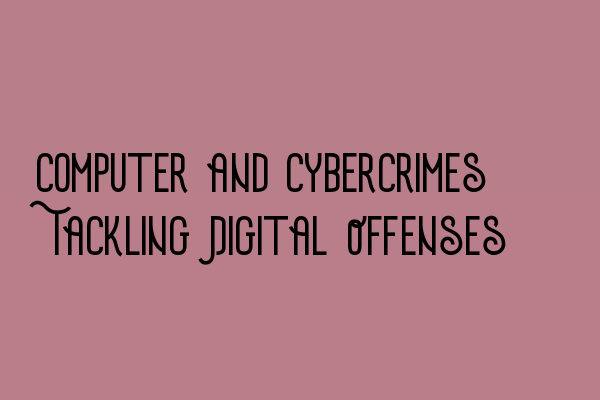Computer and Cybercrimes: Tackling Digital Offenses
Welcome to the SQE Criminal Law & Practice Law UK blog! Today, we delve into the fascinating world of computer and cybercrimes. In a rapidly evolving digital landscape, where technology continually shapes our lives, it is crucial to address the rising challenges posed by online offenses. As a solicitor, I aim to shed light on this pressing issue and provide insights into effective strategies for tackling digital crimes.
The Growing Threat of Cybercrimes
Cybercrimes encompass a wide range of offenses committed through digital means. These offenses include hacking, identity theft, phishing, online fraud, and the distribution of illegal content. With the increased digitization of our personal, professional, and financial lives, the risks of falling victim to cybercriminals have become more significant than ever.
Related Article: SQE 1 Practice Exam Questions
Understanding the Motivations
Before we delve into tackling computer and cybercrimes, it’s essential to understand the motivations behind these offenses. Cybercriminals are often driven by financial gain, seeking to exploit vulnerabilities in digital systems to illicitly access sensitive information or money. Additionally, some cybercrimes are politically motivated, aiming to disrupt critical infrastructure or steal sensitive data for espionage purposes.
Preventive Measures: Educating and Empowering Users
The first line of defense against cybercrimes is education. Individuals and businesses must be aware of the risks posed by online threats and actively take steps to mitigate them. Employers should provide regular training to employees, emphasizing the importance of strong passwords, safe browsing habits, and the recognition of suspicious emails or links.
Furthermore, implementing robust security measures, such as firewalls, antivirus software, and secure networks, can significantly reduce the likelihood of a successful cyber attack. Regular software updates and patch management are also crucial, as they often contain important security fixes.
Related Article: SQE 1 Practice Mocks FLK1 FLK2
Legislation and Law Enforcement
The legal framework surrounding computer and cybercrimes is continuously evolving to keep pace with technological advancements. In the UK, the Computer Misuse Act 1990 establishes the offenses related to unauthorized access, modification, or disruption of computer systems.
Additionally, the police and law enforcement agencies have specialized units dedicated to cyber-related crimes. These units employ highly trained professionals equipped with the knowledge and tools necessary to investigate and prosecute cybercriminals. Collaboration between law enforcement agencies, private organizations, and international partners is essential in the global battle against cybercrimes.
Related Article: SQE 2 Preparation Courses
The Role of Digital Forensics
Digital forensics serves a critical role in investigating computer and cybercrimes. It involves the collection, analysis, and preservation of electronic evidence from computers and digital devices. Forensic experts utilize specialized techniques and tools to uncover digital footprints left by cybercriminals, assisting in identifying the perpetrator and building a solid case for prosecution.
Law firms specializing in cybercrimes frequently employ digital forensic experts who work closely with solicitors to gather evidence, provide expert testimony, and strengthen the legal position of their clients.
Related Article: SQE 1 Preparation Courses
The Future of Tackling Cybercrimes
As technology continues to advance, the battle against cybercrimes must remain dynamic and adaptable. Organizations must invest in regular cybersecurity audits, stay vigilant against emerging threats, and promote a culture of cyber awareness and resilience.
Related Article: SRA SQE Exam Dates
Conclusion
Cybercrimes pose an ever-increasing threat to individuals and businesses alike. By embracing a multi-pronged approach that combines education, preventive measures, legislation, law enforcement, and digital forensics, we can effectively tackle digital offenses and safeguard our digital lives.
Stay tuned to our SQE Criminal Law & Practice Law UK blog for more informative articles and insights into the world of legal practice.
